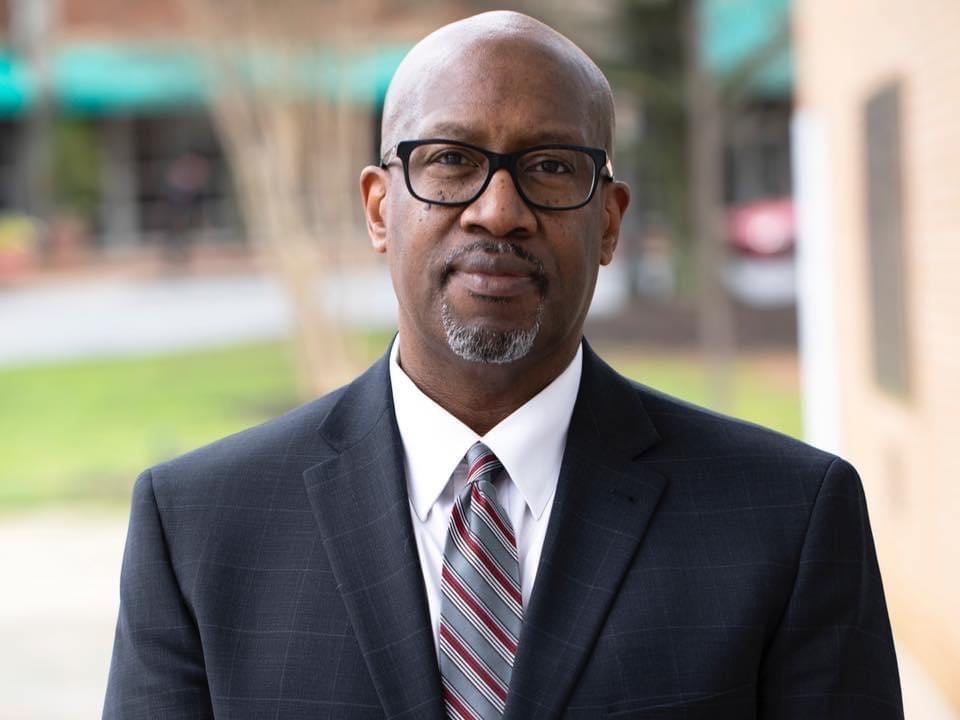- Morehouse College is a historically Black men's college in Atlanta.
- Douglas Cooper, the career-services director, advises students as they enter into the workforce.
- That means providing the tools to navigate anti-Blackness.
Douglas Cooper, who is Black, started his career at IBM in 1987.
One day, as he was having lunch with a mentor, he noticed the cafeteria was serving fried chicken, collard greens, and slices of watermelon. He remembers being very conscious of his Blackness in what was a very white environment. Cooper weighed whether eating the lunch would perpetuate Black stereotypes. He asked his mentor if he felt the same way. His mentor turned to him and said, "Doug, you think they don't know that you're Black," he recalled with a laugh.
"It was the simplest explanation as to being as good as you can and what you do and not to let other people's perceptions of you dictate how you carry yourself," Cooper said.
Today, Cooper is the executive director of career services at Morehouse College, the historically Black men's college in Atlanta, whose alumni include Martin Luther King Jr. and Spike Lee. In Kamala Harris, who attended Howard University in Washington, DC, there's a historically Black university grad serving as vice president.
In his counseling of students, Cooper said that while he has struggled with it, he has encouraged students who wear dreadlocks to cut them off as they move into interview processes and network in more conservative industries like financial services.
"It's unfortunate that that was one of the many accommodations we, as Black Americans, had to make to decrease the potential of race-based discrimination in the workplace," he added. That was especially true a decade ago, but he said he's seen a shift toward greater acceptance of natural hair since then.
Another HBCU, Hampton University, drew a lot of attention for banning dreadlocks and cornrows for some business students in 2001. Researchers in the diversity, equity, and inclusion field that Insider spoke with had mixed opinions: There's a potential cost for keeping the dreads, in terms of facing biases, but also a potential cost for losing them, in light of possibly losing personal authenticity. These are the still-complicated dynamics of professionalism in America.
The HBCU experience is something of an "artificial" environment, Cooper pointed out. "You're surrounded by all these really motivated, smart, ambitious, young Black men. You're one of hundreds, of thousands," he said of Morehouse. "But when you leave Morehouse, the world will look very different."
Cooper said that, in the US, whether becoming a blacksmith or an attorney, people of color are questioned on their capabilities and professionalism. "The equalizer is continuing to work on your craft and be the best in terms of the quality of the work you provide that will negate questions of your professionalism," he said.
This is not exactly borne out in the data: In the Utah State University sociologist Christy Glass' extensive interviews, Black leaders reported being under more pressure the further they advanced in their careers. "As the stage gets bigger, the spotlight gets bigger, and as you move up, you become even more exceptional for your difference," said Glass, who is white.
If being perceived as professional is really about navigating workplace culture, Cooper said, then another key is networking. A mentor can help you understand office hierarchy or the preferences of particular personalities. And high-achieving alumni show what's possible.
"Broadly, it's true that professionalism is historically associated with white maleness, but there are a lot of Morehouse grads in influential positions," Cooper said, and having access to them helps students. "Young Black professionals, their perception of professionalism is not defined by white maleness — but those who are in positions of influence that are successful who they look to model their careers after."
